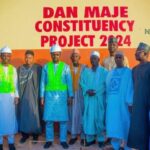Th e Nigerian Communications Commission [NCC] has said more broadband Infrastructure Companies [Infracos] will soon come on board as another set of licenses are being processed for investors to set up shops in southsouth, south-west and north-west zones of the country. Th e Executive Vice Chairman of NCC, Prof Umar Garba Danbatta, who disclosed this in Lagos recently at a meeting with editors and reporters of media houses, said infracos would add to the four companies that had been licensed before now. ‘’Recently Zinox Technology Limited was licensed for broadband infrastructure provisioning for South East zone while Brinks Integrated Solutions Limited was issued license for the North East zone. Infrastructure Company Limited, a subsidiary of MainOne Cable Company Limited, had earlier been licensed to provide services in Lagos while IHS was issued a license to cover the North Central zone, including Abuja.
The INFRACO licenses are based on the NCC’s Open Access Model (OAM) in line with the National Broadband Plan. Licenses are being processed for South South, South West and North West Zones’’, Prof Danbatta said. He said with a combination of licenses for infrastructure provisioning and spectrum auctions, and re-farming of some of the existing spectrum to make them more efficient, the NCC hoped to attain the recommendation of the National Broadband Plan, and possibly surpass it by the end of 2018. ‘’Let me also mention that the International Telecommunications Union report credited to Nigeria indicated a 22% broadband penetration since 2017. Therefore, the Commission is working assiduously to accomplish the 30% national target for 2018 as envisaged in the National Broadband Plan (NBP 2013- 2018)’’, he added. He said the NCC had sustained its commitment towards bridging the broadband divide.
‘’Hence, we have intensified eff orts in the provision of connectivity in secondary and tertiary institutions across the country where we provide support in a programme called Digital Access Programme, and Digital Appreciation Programme for Tertiary Institutions, ADAPTI. We are also supporting a programme of Inter-Campus Connectivity, through the National Universities Commission, NUC, to ensure exchange of ideas and research at that level of education. We are providing support for JAMB for its online examination facilities, among similar projects’’, he said.
On quality of telecom service, he said the NCC had directed service providers to live up to the expectations of the consumers, or face the consequences of their actions, which may include publication of their QoS performances for observation of the members of the public. He added that NCC is also engaging with telecom service providers regularly with a view to tackling the quality of service challenges. He also said the NCC is currently seeking for a review of the National Economic Councils recommendations on ways that will eliminate multiple taxation and regulations that have created bottlenecks in the provision of services in diff erent states of the federation.
‘’ ICT has huge potential for the future economic development of the country. Th is is why we are consulting with governments at various levels, especially with the state governments to key into these huge potentials. This they can do by discouraging some of their offi cials, agencies and departments that create bottlenecks with multiple regulation and taxations, and denial of rights of ways that hinder fast deployment of infrastructure and services’’’, he said.
NCC, he said, had identifi ed coverage gaps across the country, and ‘’using a combination of regulatory frameworks and incentives, the Commission is working towards bridging the gaps currently existing in various parts of the country’’. He also said the subscription to Do-Not-Disturb Code, 2442 ,which enables the subscriber to stop indiscriminate unsolicited text messages in their phones, ‘’had little above One million activation by early 2017 but today we have about 9 Million subscribers activating the DND’’.
According to him, the telecom sector could only boast of a mere $50 Million worth of investments in 2001, but as at September 2017, the investments had hit $70 Billion. ‘’The Value Added Services(VAS), segment of the telecom market in Nigeria today is worth US$200 Million and is estimated to grow to US$500 Million by 2021. Th e industry has provided both direct and indirect employment opportunities, and accentuated growth and expansion of SMEs’’, he said.
 Join Daily Trust WhatsApp Community For Quick Access To News and Happenings Around You.
Join Daily Trust WhatsApp Community For Quick Access To News and Happenings Around You.


